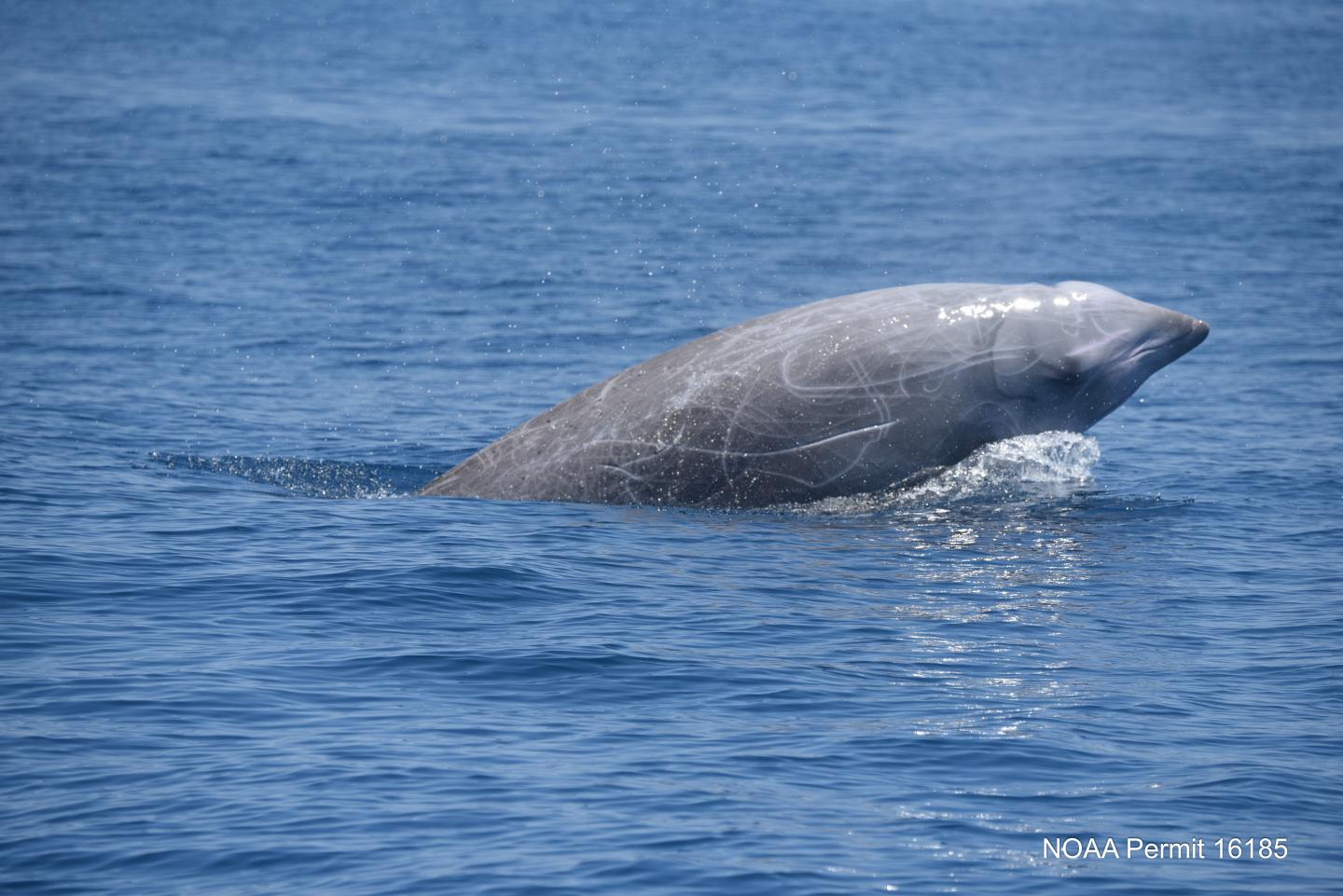Cuvier’s beaked whales go a mile deep, hold breath for an hour

Credit: Andrew J. Read
DURHAM, N.C. — A new Duke University-led study provides the first detailed record of the diving behavior of Cuvier’s beaked whales in U.S. Atlantic waters.
Cuvier’s beaked whales are the world’s deepest-diving mammal, but studies of their behavior are constrained by the animals’ offshore location and limited time spent at the surface.
The new data, recorded from 5,926 dives of tagged whales off Cape Hatteras, N.C., showcases the remarkable diving abilities of these animals and provides new clues to how they make a living at the extremes of depth and cold.
“Their deep dives average about 1,400 meters, lasting about an hour, while they are feeding near the sea floor. They typically only spend about two minutes at the surface between dives,” said Jeanne Shearer, a doctoral student in ecology at Duke University’s Nicholas School of the Environment. “It’s amazing that they can dive to such depths, withstand the pressure, and be down there that long, with such brief recovery times.”
Past studies have documented the diving behavior of Cuvier’s beaked whales in Pacific waters, Italy, and the Bahamas, but this is the first one focused in the U.S. Atlantic. Scientists estimate about 6,500 Cuvier’s beaked whales live in the northwest Atlantic. Populations in different areas exhibit some differences in diving behavior, highlighting the need for data from around the world.
To conduct the study, scientists attached LIMPET satellite-linked tags to 11 Cuvier’s beaked whales that live and dive most of the year in waters a two-hour boat ride from Cape Hatteras. One tag failed, but the other 10 recorded 3,242 hours of behavioral data from 5,926 individual dives — both deep and shallow — between 2014 and 2016.
Aside from the extremely deep dives that these whales are able to make, the data showed that they dive nearly continually, with deep dives followed by 3-4 shallow dives that extend to around 300 meters. How they continuously dive to these depths without long recovery periods is still a mystery to scientists.
“Cuvier’s beaked whales are only half the size of the sperm whale,” Shearer said. “Their dives push the limits of mammalian physiology, but we still don’t know how they’re able to behave this way.”
She and her colleagues published their peer-reviewed findings Feb. 6 in the journal Royal Society Open Science.
Aside from adding to our knowledge of the species’ remarkable diving capability, the findings provide a baseline for controlled experiments, now underway at Duke, to study their reactions to low levels of sonar.
“It’s important to understand their typical diving behavior in order to interpret the results of behavioral response studies,” said Shearer, who conducts her research at the Duke University Marine Laboratory in Beaufort, N.C.
“These animals are fascinating and there is so much we still don’t know about their behavior and physiology,” Shearer said. “They are the world’s deepest mammalian divers, but we don’t yet understand how they dive to such extremes.”
###
Funding for the new study came from the U.S. Fleet Forces Command.
Shearer’s co-authors were Nicola Quick, William Cioffi, Heather Foley, Zachary Swaim, Danielle Waples and Andrew Read, all of Duke; Robin Baird and Daniel Webster of Cascadia Research Collective; and Joel Bell of Environmental Conservation, Marine Resources Section, at Naval Facilities Engineering Command Atlantic.
CITATION: “Diving Behaviour of Cuvier’s Beaked Whales (Ziphius cavirostris) Off Cape Hatteras, North Carolina,” Jeanne M. Shearer, Nicola J. Quick, William R. Cioffi, Robin W. Baird, Daniel L. Webster, Heather J. Foley, Zachary T. Swaim, Danielle M. Waples, Joel T. Bell and Andrew J. Read. Royal Society Open Science, Feb. 6, 2019. DOI: 10.1098/rsos.181728
Media Contact
Tim Lucas
[email protected]
919-613-8084
Original Source
https:/
Related Journal Article
http://dx.




